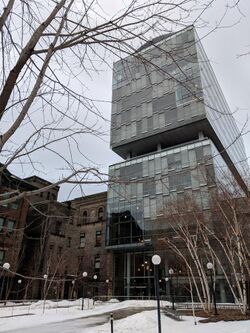Organization:University of Toronto Institute of Biomedical Engineering
 The Institute of Biomedical Engineering primary location is in the Mining Building (left) at the University of Toronto. | |
Former names | Institute of Biomaterials and Biomedical Engineering, Centre for Biomaterials, Institute of Biomedical Engineering, Institute of Biomedical Electronics |
|---|---|
| Type | Public |
| Established | 1962 |
| Postgraduates | 300 |
| Location | Toronto , Ontario , Canada |
| Affiliations | University of Toronto |
| Website | http://www.bme.utoronto.ca/ |
The Institute of Biomedical Engineering (BME) is an academic unit at the University of Toronto which provides graduate education and advance research in the field of biomedical engineering. Established in 1962 by Dr. Norman Moody under the moniker 'Institute of Biomedical Electronics',[1] the Institute has taken on several other names in the past.
BME is home to research and teaching interests of the Faculties of Applied Science and Engineering, Dentistry, and Medicine at the University of Toronto. Located in the heart of the Toronto Discovery District, BME offers research ties with sister departments at University of Toronto, as well as researchers in the Hospital for Sick Children, University Health Network, Mount Sinai Hospital, Sunnybrook Health Sciences Centre, the new Women's College Hospital, St. Michael's Hospital (Toronto), Toronto Rehabilitation Institute, Bloorview Kids Rehab and MaRS Discovery District.
History
Founded in 1962 by Dr. Norman Moody, the Institute of Biomedical Engineering (BME) is one of the oldest biomedical engineering academic units in Canada.[2] With a heavy emphasis on applying electrical engineering concept to solve biological problems, the Institute formed between a collaboration between the Faculty of Engineering and the Faculty of Medicine at the University of Toronto.
In 1999, the Institute of Biomedical Engineering (IBME) merged with the Centre for Biomaterials and the tissue engineering group in Chemical Engineering, to create the Institute of Biomaterials and Biomedical Engineering (IBBME, 1999 - 2000). In addition to Medicine and Engineering, IBBME is also a part of the Faculty of Dentistry.
In the fall of 2001, with the help of funding from the Whitaker Foundation, the Institute launched the new Graduate Program in Biomedical Engineering.
In summer of 2020, the Institute of Biomaterials and Biomedical Engineering changed its name to the Institute of Biomedical Engineering (BME).
Academics
The Institute of Biomedical Engineering hosts faculty members and students who conduct research in the topics of clinical engineering, cell & tissue engineering, and molecular engineering. BME offers Doctors of Philosophy (PhD), Masters of Science (MASc), Masters of Health Science (MHSc), and Masters of Engineering (MEng). Students enrolled in the PhD and the MASc programs are required to perform research in one of the three disciplines[3] listed above. As of 2019, there are a total of 332 graduate students, half of whom were PhD students.[4]
References
- ↑ December 31, Richard Cobbold Stories; Read, 2018 5 Min. "History" (in en-CA). https://discover.bme.utoronto.ca/history/.
- ↑ "History - University of Toronto Biomedical Engineering" (in en-US). https://bme.utoronto.ca/about-bme/history/.
- ↑ "Faculty & Research - University of Toronto Biomedical Engineering" (in en-US). https://bme.utoronto.ca/faculty-research/.
- ↑ "Biomedical Engineering - University of Toronto" (in en-CA). https://discover.bme.utoronto.ca/annual-report/.
External links

